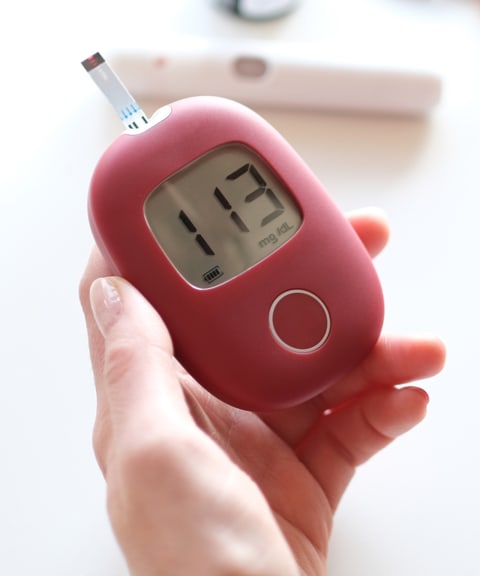Advertisement
How To Maintain Healthy Blood Sugar, Starting With Your Gut

Keeping your blood sugar in check is one of those tricky balancing acts that our bodies are constantly trying to manage. You're probably familiar with what happens when it dips too low—better known as being hangry.
And while factors like diet and exercise play a major role in balancing your blood sugar, ultimately it comes down to—like so many other things—your gut.
But type "gut health" into your search bar these days, and you'll be met with pages upon pages of pseudoscience and vague, untested claims (trust us; we've done it). That's why we've partnered with Pendulum Therapeutics—a new, cutting-edge company that's already at the forefront of bioscience—to sort through the clutter and set the record straight on what you need to know about this link between blood sugar and gut health.
First, a quick refresher on blood sugar.
Also known as glucose, blood sugar is your body's preferred source of energy, and it is one of two products from the food you eat (the rest is stored as fat). Your blood is the vehicle that carries this source of energy to your body's cells, allowing them to do...basically everything.
All of this is regulated by a complex process involving your liver, small intestine, and pancreas (aka the gut). The pancreas releases a hormone called insulin, which allows your cells to absorb that sweet, delicious glucose in the first place. Those with type 2 diabetes however, produce less insulin—or their insulin isn't working as it should—and, over time, they have trouble regulating their levels of blood sugar.
Still with us? Good.
I thought you said something about gut health?
Correct. So let's move on to the hero of our story: Your gut (also known as the gut microbiome). As you probably already know (you did click on this article, after all), your gut microbiome plays a huge role in a multitude of bodily functions. And aside from affecting your digestive system or brain heath, bacteria in your gut can have profound effects on your blood sugar as well.
Those with type 2 diabetes can have more bacteria circulating through their bloodstream, in part because their high-fat diet can cause these bacteria to leak out of their home in the gut. This can trigger an inflammatory response that can then lead to insulin resistance, which you already know is a problem for those trying to regulate their blood sugar (aka, everyone).
What if I'm not diabetic? Does any of this matter to me?
More than you realize. Last year, there were 86 million people with prediabetes in the U.S. alone—and 90% of them were unaware! According to Pendulum's chief medical officer—Orville Kolterman, M.D.—you should still be proactive about monitoring your blood glucose levels because they may become elevated even if you're unaware.

Additionally, says Kolterman, elevated glucose isn't something you can always feel until it gets out of control. It's sort of a silent marker that creeps up over time. But by taking a proactive approach to your overall health (which he strongly recommends), you could potentially be preventing an onset of something much more serious down the road.
So how do I keep my microbiome healthy?
Glad you asked. Focusing on a diet that's rich in soluble fiber is a great place to start. Think: whole foods like fruits and vegetables (especially garlic, jicama, and leeks), as well as foods that contain polyphenols, like coffee, dark chocolate, and teas.
Beyond that, cutting-edge probiotic brands like Pendulum are changing the game by making people healthier through microbiome-targeted solutions. While "gut health" products are a dime a dozen these days, Pendulum's medical probiotic puts them in a league of their own with nine patents, five pending, and 20-plus more in the works.
Their flagship product—Pendulum Glucose Control—is the first and only probiotic that lowers A1C levels and blood glucose spikes for the dietary management of type 2 diabetes, and they have a peer-reviewed clinical trial that proves it.
That's a lot of science, but put simply: Pendulum delivers meaningful benefits for managing blood sugar levels using a formula of probiotics and a prebiotic that can't be found in any other probiotic on the market.
I already take a probiotic—is that enough?
Not all probiotics are the same. In fact, most probiotics use the same two groups of bacteria: Bifidobacterium and Lactobacillus, which provide generic gut health benefits. Pendulum Glucose Control is different from what you'd find at the grocery store and here's what separates them from other probiotics:
First is that their formula clinically tested. Regular probiotic supplements typically speak to clinical data for certain strains they include in their product, but their actual formulation hasn't been clinically tested to demonstrate the results they cite.
Pendulum Glucose Control is also targeted, addressing unique deficiencies in your gut microbiome and restoring lost functionality to help manage chronic disease.
And finally, the bacteria strains found in Glucose Control are novel (several of which were discovered and patented by Pendulum using DNA sequencing).
Got it. Anything else I'm overlooking?
These days, people want results from their changes immediately. But according to Kolterman, many of us forget (or ignore) the fact that it takes much longer than a day or two to notice things like elevated blood sugar or increased weight. Being patient and setting realistic expectations (rather than extreme lifestyle changes) is a great place to start, but we should also keep in mind that holistic factors like sleep, stress levels, other medications, illness, and alcohol intake can play a major role in managing our blood sugar.

